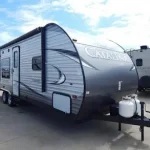Renters insurance can give you peace of mind about your belongings. In fact, you might need a coverage plan to sign a free rental application. In this blog post, we’ll explain what this insurance covers, how it works, and why you need it.
What Does Renters Insurance Cover?
Renters insurance protects your personal belongings by covering replacement and repair costs in certain situations. Here are just some hazards your insurance policy should protect you from:
- Fire/lightning
- Explosions
- Hail
- Riots
- Vandalism
- Falling objects
- Extreme weather
- Frozen pipes
If somebody steals your items, you’ll similarly have full protection. Your policy might also include arranging replacement locks. It can even include rent for temporary housing if the current home suddenly becomes uninhabitable.
A standard HO-4 policy is very comprehensive, even including volcano damages. However, you won’t have protection against floods or earthquakes. Every provider is different, so always check the fine print. Compare multiple options and go with one that fits your belongings and situation.
HO-4 policies also usually include liability insurance. They’ll cover you if someone has an injury on your property or their property faces damages.
Why You Need Renters Insurance
Your landlord isn’t responsible for your belongings, even in extreme situations. Rental coverage could save them or at least help you arrange replacements without breaking the bank. Here are seven reasons you should have renters insurance:
- More tenancies: Some tenancies require you to have HO-4 coverage. Getting it could open you up to a broader range of housing options.
- Lower costs: If you don’t have coverage, you must replace everything yourself. The costs can quickly add up for any renter, even for cheap items.
- Built-in liability coverage: If somebody has an injury in your home, they might sue you. HO-4 insurance’s liability coverage lets you avoid high legal fees.
- Short-notice relocation: If the property faces severe damages, you might need to stay elsewhere. Rental insurance can cover short-term hotel stays.
- Cost-effective: You don’t have to worry about facing high fees after a fire or theft. Good coverage saves you from high expenses for a low monthly cost.
- Not limited to the home: Many people believe that the coverage only works for items at home. Many HO-4 plans help with theft and damages anywhere.
- Peace of mind: Without insurance, the thought of suddenly losing your belongings could be terrifying. Good coverage can make this a lot easier.
Average Costs of Renters Insurance
Every plan has a different price. According to NerdWallet, renters insurance costs an average of $12 a month. However, In Louisiana or Mississippi, it can be as expensive as $21 monthly. Your final price depends on several factors, including:
- The likelihood of a disaster
- Your previous claim history
- Your credit-based insurance score
- Your pet’s breed (if applicable)
More secure homes (i.e., ones with alarm systems) can sometimes get cheaper plans. If you buy from a company you already use, you may get a discount. Take advantage of any deal you can, especially in more expensive states.
Choosing Your Insurance Policy
When deciding on a policy, start by making an inventory of your belongings. You should include any furniture, clothing, electronics, appliances, jewelry, and collectibles. Figure out the value of each item. You’ll then know how much coverage to look for.
Look at the policies available and compare the prices. You’ll need renters insurance that covers the current value of your belongings and can suitably replace them.
Don’t settle for whatever you find first. Check each offer’s premiums (monthly fees), deductibles (amount you pay before insurance), and coverage limits (maximum payouts). Go to a company you’re already with and try to get a “bundle” that includes rental insurance.
Understand each plan’s limitations before committing to any of them. For example, some of your belongings might be too high-value for any policy. Once you have a plan you’re happy with (fine print included), start paying for it.
Filing a Renters Insurance Claim
Once you need to call upon your policy, do so immediately. Take photos or videos of your items to show their current condition. If somebody stole them, provide evidence of the theft. Call 911 if necessary and secure the home.
Review your plan’s finer details and contact your insurer. Prepare to prove how much your items cost with receipts and other valuations. Fill out a claim form and give as much detail as possible about the incident.
An adjuster may visit your home to check the damage or ask for extra evidence. Cooperate with them as best you can. Once they approve your claim, they should contact you about getting the money. If they deny it, appeal their decision.
Final Thoughts
The choice to get renters insurance doesn’t have to be stressful. You’ll be glad you have it if you ever need to file a claim. Compare every available plan, and don’t settle for anything other than a fair deal.







